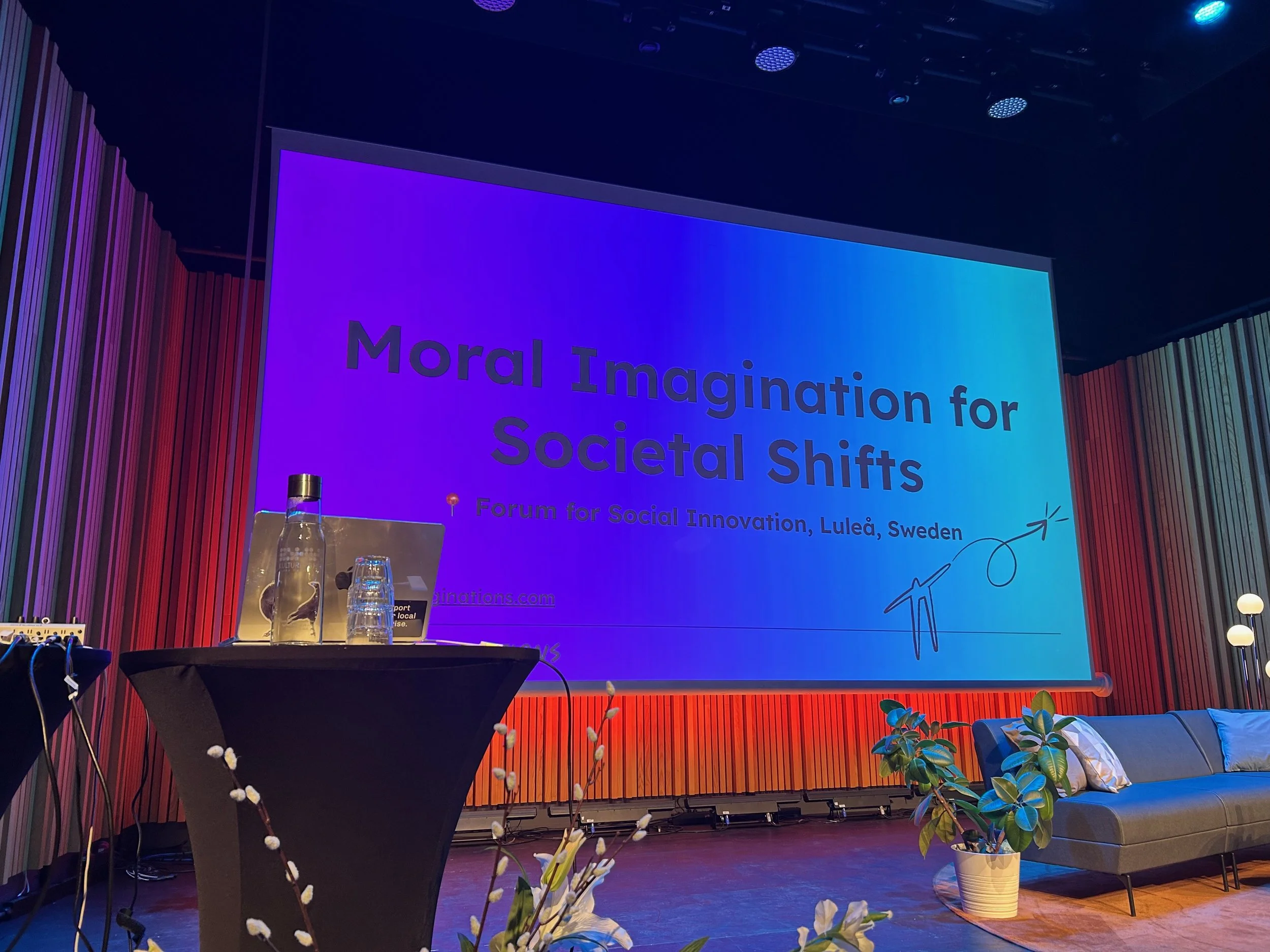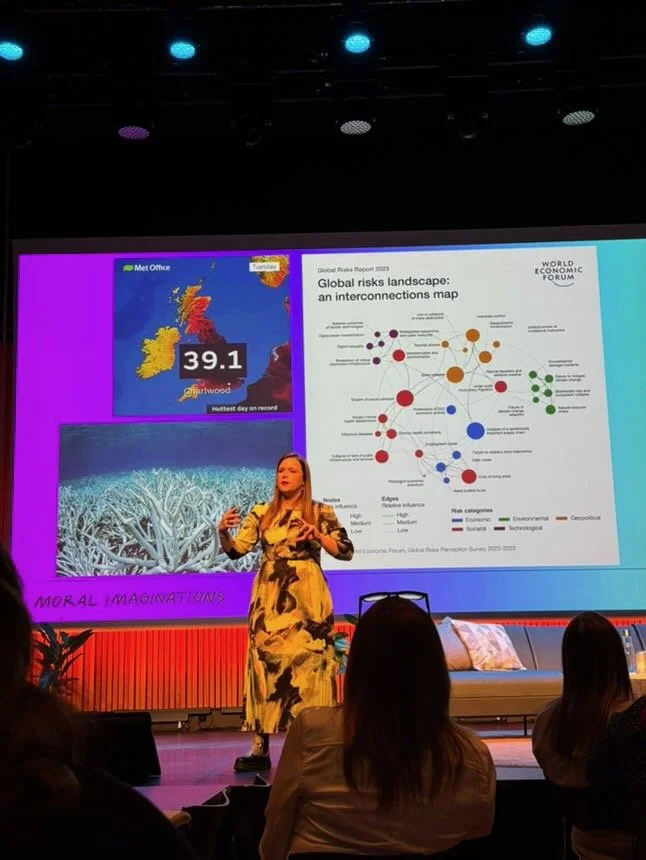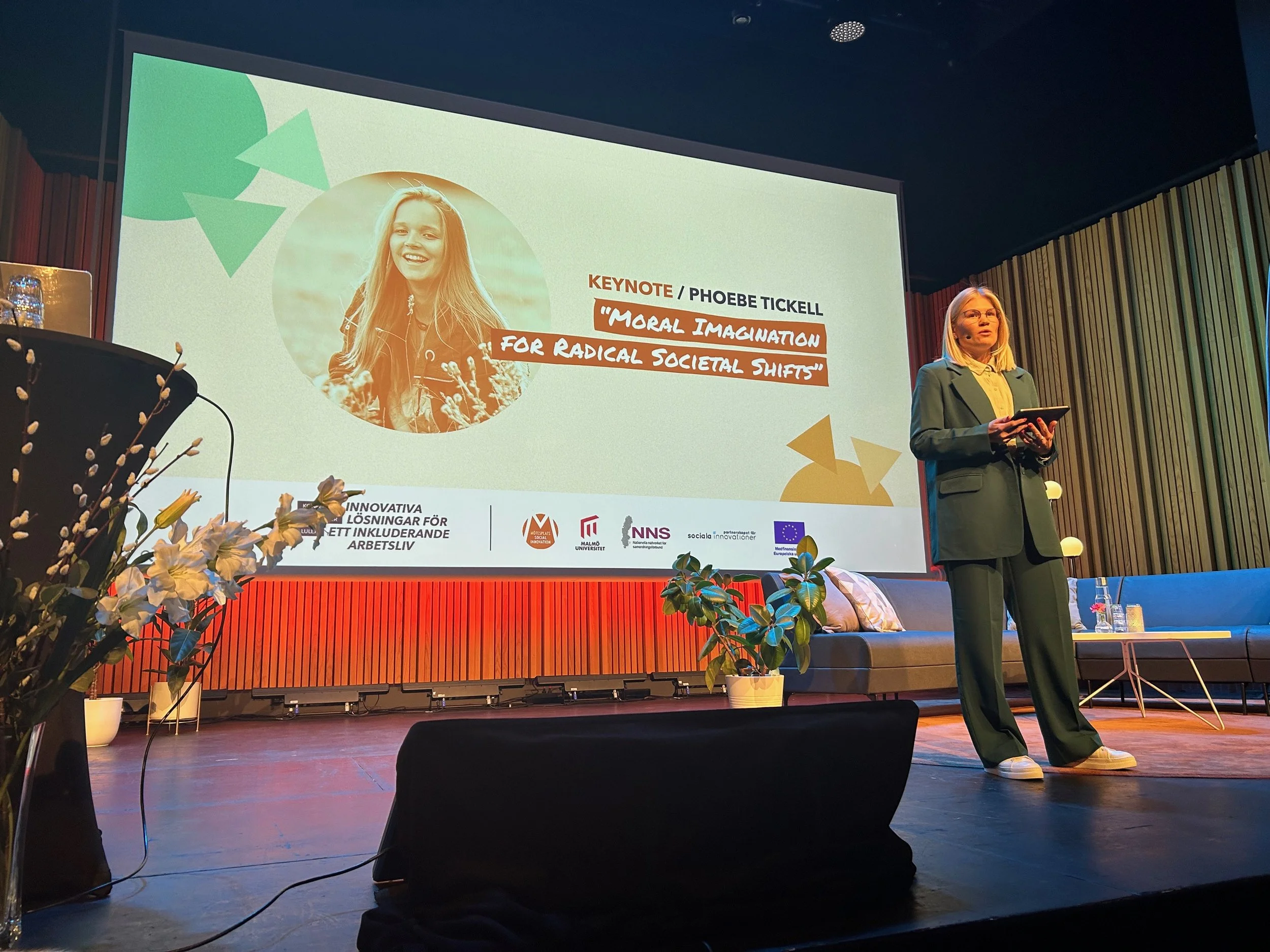Why Moral Imagination Opens the Way for Radical Societal Shifts
This is an interview done by the Forum for Social Innovation Sweden, part of the Competence Centre for Social Innovation, on my work on Moral Imagination as a route towards societal shifts.
On October 23rd, I was the keynote speaker at the Forum for Social Innovation Sweden, titled “Innovative Solutions for an Including Working Life" on Moral Imagination for societal shifts. This is an interview that was conducted by Lotta Orban, at the Forum for Social Innovation, two weeks before the conference. The original interview is found here: https://socialinnovation.se/why-moral-imagination-helps-open-the-way-for-radical-societal-shifts/. I hope you enjoy it!
Opening the Forum for Social Innovation Sweden’s annual conference in Luleå, Sweden
Phoebe Tickell is a British-Hungarian imagination activist inspiring people to see that a beautiful world is possible. Rather than getting paralysed by the crisis, shutting down, and moving into a shame and blame game, we need to live up to our human values, bringing together the capacity to act by using inspiration and moral ambition.
Phoebe describes herself as a scientist as she started her career in biology as a researcher and in microbial engineering. When Phoebe found that science did not give the solutions needed for the scales of challenges we face, and when the techno-utopian narrative frustrated her, she changed paths and became a social entrepreneur.
— We already have all the technology and research we need to solve the problems we face, she says.
We already have all the technology and research we need to solve the problems we face
After working with complex systems and systems thinking, with education, governments, and a community funder, as well as within the food, farming, and regenerative agriculture industry, where she applied distributed governance, network design, and community building, she found that there was a common thing was missing.
— People cannot imagine how things can be different, they are blocked from believing another way is possible, she says.
Founding the organisation Moral Imaginations
This is why she started working with and founded the organisation Moral Imaginations, a design and practice lab for experiential collective imagination in 2020. Phoebe Tickell now works to convince people that another future and society is possible, based on a regenerative idea, expanding on care, kindness, and reciprocity.
— I aim to seed, catalyse and coordinate projects that re-write our current story, she says.
Phoebe Tickell is herself very influenced by indigenous and Buddhist thinking and principles. When traveling to the US for the first time when she was 19 years old, she happened to pick up the book “I Buried My Heart in Wounded Knee”, which chronicles the genocide and colonisation involved in the foundation of the United States, and was shocked.
— Why didn’t we learn about colonisation in school and the extermination of the Indigenous people who lived in reciprocity? They respected enoughness and lived in a symbiotic relationship with nature, but they were punished, she says and continues:
— We have so much to learn about regenerative principles, from ancient and wise cultures. How to use social design, that is guided by longevity and learn how to take care of the whole.
“Buddhism is a helpful guide on how to live”
After graduating from university, Phoebe took 6 months off to travel around Southeast Asia. She stayed in ashrams, living simply, and came across Buddhism. Phoebe believes Buddhism is a helpful guide on how to live. With its humble and wise stance, it focuses on how to cultivate presence and interconnection and is based on meditation and practice.
Now Phoebe Tickell is working as an 'imagination activist, a term she coined to describe a new and at the same time ancient kind of activism. Whereas traditional activists fight the current system, the oppressive power, the imagination activist is a complement, imagining the new.
— Activists ring the alarm and call out to people who have done wrong. Protecting and resisting harm. Using guilt and shame and calling for responsibility. Imagination activists inspire people to see that a beautiful world is possible. By cultivating faith and taking action we can create that future", says Phoebe Tickell.
Imagination activists inspire people to see that a beautiful world is possible. By cultivating faith and taking action we can create that future.
Moral Imagination allows us to stretch empathy
Rather than getting paralysed by the crisis in society and shutting down and moving into a shame and blame game, we need to live up to our human values. Not focusing on the crisis but bringing together the capacity to act by using inspiration and moral ambition.
— Moral Imagination allows you to stretch empathy. Imagination can be used for imagining and being the other person with no privileges, Phoebe says.
Photo taken during the keynote presentation at the Forum for Social Innovation, Luleå, Sweden
Inspiring and helping organisations to see the extent of the crisis
Phoebe Tickell runs workshops, gives talks, and creates tools to enable communities to work with moral imagination and to create ambassadors. She has also worked with several large organisations to build their ‘moral imagination infrastructure’. She uses different methods and tools such as role-play exercises, the Exploring Different Compass, with which people can explore different topics and perspectives, group exercises, and personal reflections. She’s now working to create spaces for collective capacity building for civil society, but also inspiring and helping organisations and communities to see the extent of the crisis.
— I work with people within organisations and government. I also work with corporates. Giving people the facts, the brain food, and the knowledge to spur action, she says.
— I let them understand the current crisis and the responsibility they have by being direct and not being scared of being uncomfortable. Some of that is about the urgency and moral imperative to change. Some are about helping the organisation to realise that they can have a different role. They can respond in different ways. Corporations have huge platforms. If they can be courageous and bold, they can have a huge influence on a sector and a whole branch. They should not wait for other organisations to be first, we need collective leadership; Phoebe Tickell continues.
Phoebe has worked with IKEA, London Marathon, AXA, and other corporations. At IKEA, she did an intervention to bring a module on moral imagination into a recurring leadership training hosted by the organisation.
— I contributed with a talk, and we did an immersive future envisioning exercise, a storytelling from the future: How can IKEA change by 2050? The commitment they are making is very encouraging, she says.
Together with Inner Development Goals, Naturskyddsföreningen, Lund University and other key partners, Phoebe is now involved in creating a network for Imagination Activists in Sweden.
Forum for Social Innovation, Luleå, Sweden
Keynote speaker at a Conference in Northern Sweden
On 23 October Phoebe Tickell is the keynote speaker at the conference “Innovative Solutions for an Including Working Life” (Innovativa lösningar för ett inkluderande arbetsliv) in Luleå, Sweden. She will give a talk on and guide a session called Moral Imagination for Radical Societal Shifts. The conference is part of the Competence Centre for Social Innovation, which offers support to ongoing projects funded by the European Social Fund Plus in Sweden.
— As a National Knowledge Platform and a Competence Centre for Social Innovation in the European Social Fund, Forum for Social Innovation Sweden sees the ability to envision social change as central to social innovation processes. It is important to create new and alternative visions of the future that can guide social change, says Anna Tengqvist, national and international coordinator at FfSIS.
— As an imagination activist, Phoebe Tickell will take us on a journey to imagining what an alternative future could look like beyond today’s established order. It is about imagining our future society if we are allowed to think freely. We need to challenge limiting norms and beliefs in ourselves and the rest of society, says Lotta Orban, project manager for the conference, and at FfSIS.
When in Luleå Phoebe is looking forward to talking to and meeting a group of people envisioning the future from a different culture, who are passionate about care and compassion, and to share activism.
Phoebe Tickell’s piece of advice on how to practice and nurture moral imagination:
It starts with yourself! Go beyond the rational and cultivate a Buddhist presence and awareness. If you want to be a potent activist you have to be present and able to show up different in the present moment – that is how you create the future.
Take care of the inner state, be joyful, passionate, and creative.
Actively ask yourself what the future you are really longing for looks like, not just focusing on how to fix the problems. Envisioning the future will help create solutions in ways you may not have imagined!
Don’t fill your time with distractions. Spend time with family, in nature, and rest.
Give time and space for reflection.
Get out of the echo chamber. Create a widening of perspectives, rewilded and diversified.
Ask yourself what nature would say, if nature had a voice. Similarly, ask yourself what future generations would say, if they had a perspective on your decisions in the current moment.
Tell stories from the future as if you already come from that future. Help people really believe that such a future is possible!
Read more:
Read more about the Competence Centre for Social Innovation in the Social Fund.
Read more about Phoebe Tickell.
Read more about Moral Imagination.


